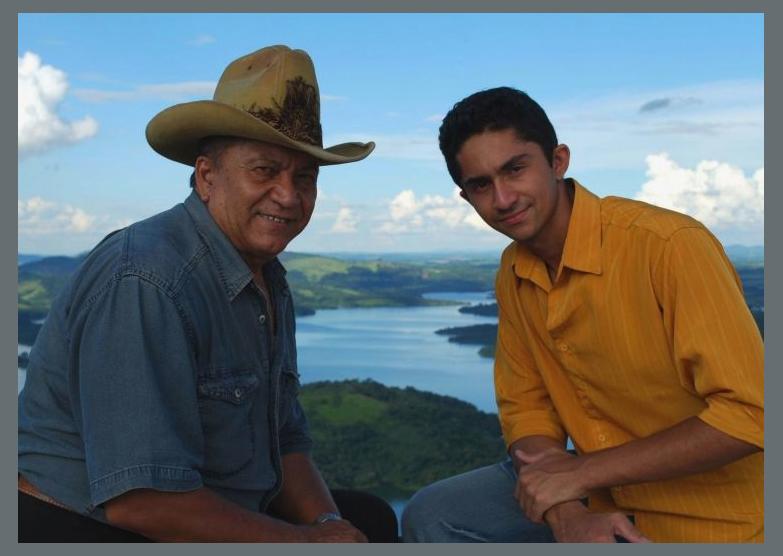 Zé Garoto e Dimboré
Zé Garoto e Dimboré
Zé Garoto e Dimboré: A Musical Voyage of Challenges and Triumphs
Emerging from the vibrant streets of Brazil, the musical duo Zé Garoto and Dimboré embarked on a remarkable journey that would forever etch their names in the annals of Brazilian music. Their signature song, "Portas Fechadas," became an instant anthem, resonating with countless hearts across the nation.
Origins and Challenges
Zé Garoto, born José Maria de Almeida, and Dimboré, real name José Cícero da Silva, hailed from humble beginnings in the northeastern state of Bahia. United by their shared passion for music, they formed a duo in the late 1950s. Their initial struggles were undeniable, as they faced financial difficulties and a lack of recognition.
Undeterred, they persevered, honing their craft in small bars and local festivals. Their raw talent and infectious stage presence gradually began to attract attention.
Controversies and Redemption
In 1962, the release of "Portas Fechadas" propelled Zé Garoto e Dimboré to national stardom. However, their success was not without its controversies. The song's explicit lyrics and themes of heartbreak and betrayal raised eyebrows among conservative critics.
Despite the criticism, the duo remained defiant, refusing to compromise their artistic vision. Their unwavering authenticity and connection with their audience ultimately silenced their detractors.
Discography and Legacy
Over the course of their illustrious career, Zé Garoto e Dimboré released numerous albums that showcased their eclectic musical style. Their repertoire included a fusion of traditional Brazilian rhythms, such as samba and forró, with modern influences like rock and pop. Some of their most notable albums include "O Ritmo do Amor" (1963), "Zé Garoto e Dimboré" (1965), and "Somos Iguais" (1970).
Their music continues to inspire and resonate with generations of Brazilians. "Portas Fechadas" remains a timeless classic, a testament to the duo's enduring legacy.
Members
* Zé Garoto (vocals, guitar)
* Dimboré (vocals, accordion)
Members
José Maria de Almeida (Zé Garoto)
Born in 1936 in the town of Santo Amaro, Bahia, José Maria de Almeida, known as Zé Garoto, possessed a natural talent for music from a young age. He moved to Rio de Janeiro in the late 1950s in search of opportunities, where he met Dimboré and formed their legendary duo.
José Cícero da Silva (Dimboré)
Born in 1933 in the city of Feira de Santana, Bahia, José Cícero da Silva, better known by his stage name Dimboré, was a gifted accordionist. His mastery of traditional Brazilian rhythms and his unique vocal style were instrumental in the duo's success.
Legacy
Zé Garoto and Dimboré left an indelible mark on Brazilian music. Their contributions to the genre of samba-rock and their fearless exploration of themes of love, loss, and social issues continue to inspire and resonate with audiences today. Their music remains a beloved and timeless part of Brazilian cultural heritage.
Emerging from the vibrant streets of Brazil, the musical duo Zé Garoto and Dimboré embarked on a remarkable journey that would forever etch their names in the annals of Brazilian music. Their signature song, "Portas Fechadas," became an instant anthem, resonating with countless hearts across the nation.
Origins and Challenges
Zé Garoto, born José Maria de Almeida, and Dimboré, real name José Cícero da Silva, hailed from humble beginnings in the northeastern state of Bahia. United by their shared passion for music, they formed a duo in the late 1950s. Their initial struggles were undeniable, as they faced financial difficulties and a lack of recognition.
Undeterred, they persevered, honing their craft in small bars and local festivals. Their raw talent and infectious stage presence gradually began to attract attention.
Controversies and Redemption
In 1962, the release of "Portas Fechadas" propelled Zé Garoto e Dimboré to national stardom. However, their success was not without its controversies. The song's explicit lyrics and themes of heartbreak and betrayal raised eyebrows among conservative critics.
Despite the criticism, the duo remained defiant, refusing to compromise their artistic vision. Their unwavering authenticity and connection with their audience ultimately silenced their detractors.
Discography and Legacy
Over the course of their illustrious career, Zé Garoto e Dimboré released numerous albums that showcased their eclectic musical style. Their repertoire included a fusion of traditional Brazilian rhythms, such as samba and forró, with modern influences like rock and pop. Some of their most notable albums include "O Ritmo do Amor" (1963), "Zé Garoto e Dimboré" (1965), and "Somos Iguais" (1970).
Their music continues to inspire and resonate with generations of Brazilians. "Portas Fechadas" remains a timeless classic, a testament to the duo's enduring legacy.
Members
* Zé Garoto (vocals, guitar)
* Dimboré (vocals, accordion)
Members
José Maria de Almeida (Zé Garoto)
Born in 1936 in the town of Santo Amaro, Bahia, José Maria de Almeida, known as Zé Garoto, possessed a natural talent for music from a young age. He moved to Rio de Janeiro in the late 1950s in search of opportunities, where he met Dimboré and formed their legendary duo.
José Cícero da Silva (Dimboré)
Born in 1933 in the city of Feira de Santana, Bahia, José Cícero da Silva, better known by his stage name Dimboré, was a gifted accordionist. His mastery of traditional Brazilian rhythms and his unique vocal style were instrumental in the duo's success.
Legacy
Zé Garoto and Dimboré left an indelible mark on Brazilian music. Their contributions to the genre of samba-rock and their fearless exploration of themes of love, loss, and social issues continue to inspire and resonate with audiences today. Their music remains a beloved and timeless part of Brazilian cultural heritage.